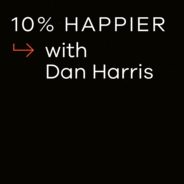Happiness levels are really high when we're young. They then steadily dip through our 20s, 30s, and 40s, and bottom out in our early 50s–at which point, they make a sharp and sudden rise. Then, through our 60s, 70s, and 80s, they are way above where we were in our youth. Why is this? Why do we get happier even as our bodies are falling apart? Here's another question: Why, from the standpoint of evolution, do humans stick around way past the point of reproductive age? The answer to all of these questions, per our guest today, is: wisdom. Dr. Dilip Jeste is a Distinguished Professor of Psychology at the University of California, San Diego, and the author of Wiser: The Scientific Roots of Wisdom, Compassion, and What Makes Us Good. In this conversation, we talk about how exactly he defines wisdom, what people of all ages can do to become wiser now, and the relationship between wisdom and loneliness. A quick content warning: this conversation includes references to sensitive topics, including suicide, substance abuse, and depression. Download the Ten Percent Happier app today: https://10percenthappier.app.link/install Full Shownotes: https://www.tenpercent.com/podcast-episode/dilip-jeste-379

Gesundheit, Wellness & BeautyLeben & Liebe
10% Happier with Dan Harris Folgen
Self-help for smart people. World-class insights and practices from experts in modern science and ancient wisdom. Hosted by veteran journalist and best-selling author, Dan Harris.
Folgen von 10% Happier with Dan Harris
947 Folgen
-
Folge vom 15.09.2021How to Get the Wisdom of Old Age Now | Dilip Jeste
-
Folge vom 13.09.2021Life, Interrupted | Suleika JaouadHere's a thought experiment: how would you handle it if you got a terrible diagnosis? Of course, many of us have no choice but to find out. This is the situation Suleika Jaouad faced when she got gravely ill at a very young age. She had to figure out how to have a sense of agency when so much was out of her control, and how to stay awake and present when her life was hanging in the balance. Suleika Jaouad is a journalist, author, speaker, cancer survivor, and the author of a book called Between Two Kingdoms: A Memoir of a Life Interrupted. She is also the creator of "Life, Interrupted," the Emmy award-winning New York Times column and video series that she created from her hospital bed. In this conversation, we talk about: Suleika's journey from being diagnosed with leukemia as a young adult to her recovery today; managing your emotions in excruciating situations; handling an ocean of uncertainty; feeding your need for creativity and productivity when your body is in mutiny mode; and the immense value of strategically going easy on yourself, especially when you're an ambitious person. Download the Ten Percent Happier app today: https://10percenthappier.app.link/install Full Shownotes: https://www.tenpercent.com/podcast-episode/suleika-jaouad-378
-
Folge vom 08.09.2021A More Relaxed Way to Meditate | Alexis SantosA common problem among type-A people is trying to win at meditation. But the practice doesn't work like that. If you over-effort, if you try to make something happen, it's pretty much guaranteed not to happen. What is guaranteed is that you will suffer. Meditation is like a video game where you can't move forward if you want to move forward too badly. Our guest today is Alexis Santos, who has been practicing meditation for twenty years and was a student of the highly influential Burmese monk Sayadaw U Tejaniya. Alexis is also a core teacher in the Ten Percent Happier app and the lead teacher of our On the Go course. In this episode, Alexis recounts his time learning from Sayadaw and shares an approach to meditation that is more relaxed than what many of us may be used to. It just might change your practice. Watch Season 2 of Ted Lasso on Apple TV+. Subscription required. Apple TV+ and/or select content may not be available in all regions. To join the Ted Lasso Challenge by midnight tonight, download the Ten Percent Happier app here: https://10percenthappier.app.link/install Full Shownotes: https://www.tenpercent.com/podcast-episode/alexis-santos-377
-
Folge vom 06.09.2021Letting Go of Perfectionism | La SarmientoIn this episode, we're talking about the difference between kindness and what our guest, La Sarmiento, calls "radical kindness," how to muster the strength to be kind to annoying people while setting appropriate boundaries, the difference between radical compassion and what the Tibetans call "idiot compassion," and their experience of learning to accept themselves in a culture that is not always so welcoming. Sarmiento, whose pronouns are they/them, has been practicing Vipassana meditation since the 1990's. They are a graduate of the Spirit Rock Community Dharma Leader Training Program and a mentor in the Mindfulness Meditation Teacher Certification Program. They serve as the guiding teacher for the BIPOC and LGBTQ+ sanghas at the Insight Meditation Community of Washington, DC, where they are also board president. We are bringing you this Ten Percent Happier podcast series in collaboration with the Apple TV+ Original Series Ted Lasso because kindness is a huge theme in the show, and there are many practical lessons embedded right in the plot. CTA: Watch Season 2 of Ted Lasso on Apple TV+. Subscription required. Apple TV+ and/or select content may not be available in all regions. Download the Ten Percent Happier app today: https://10percenthappier.app.link/install Full Shownotes: https://www.tenpercent.com/podcast-episode/la-sarmiento-376
